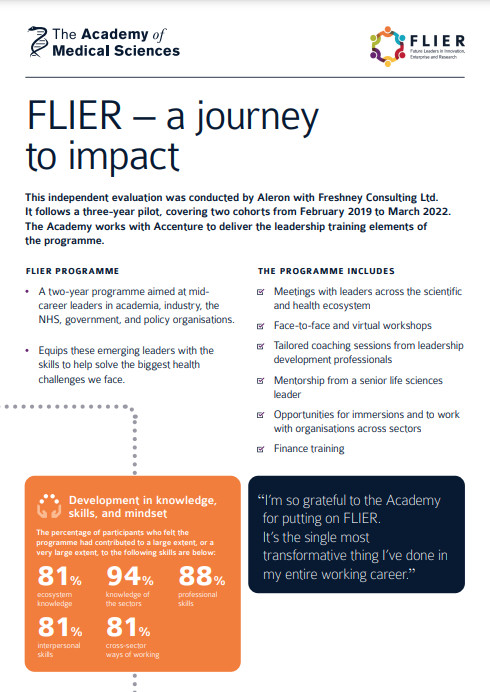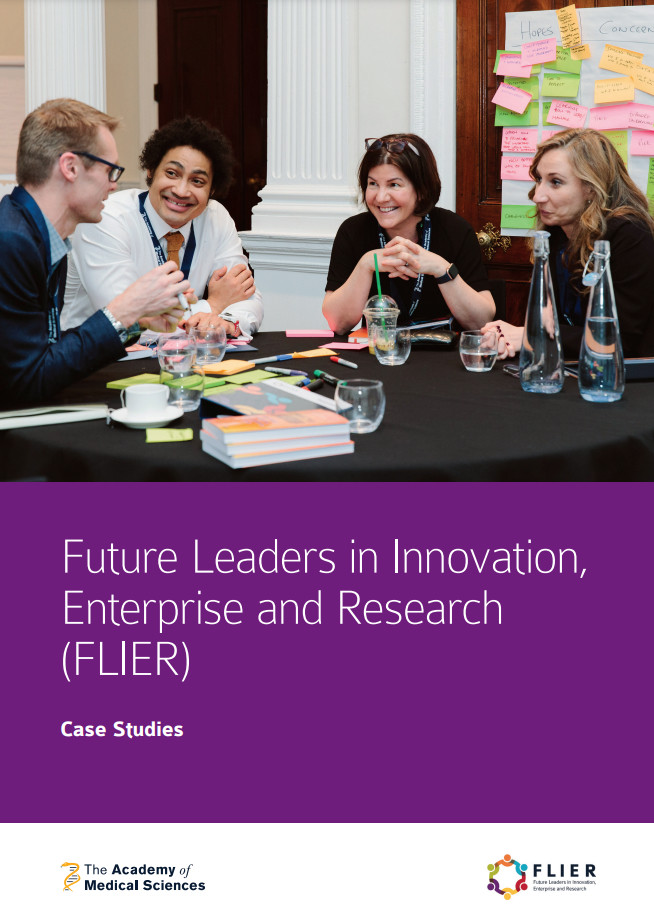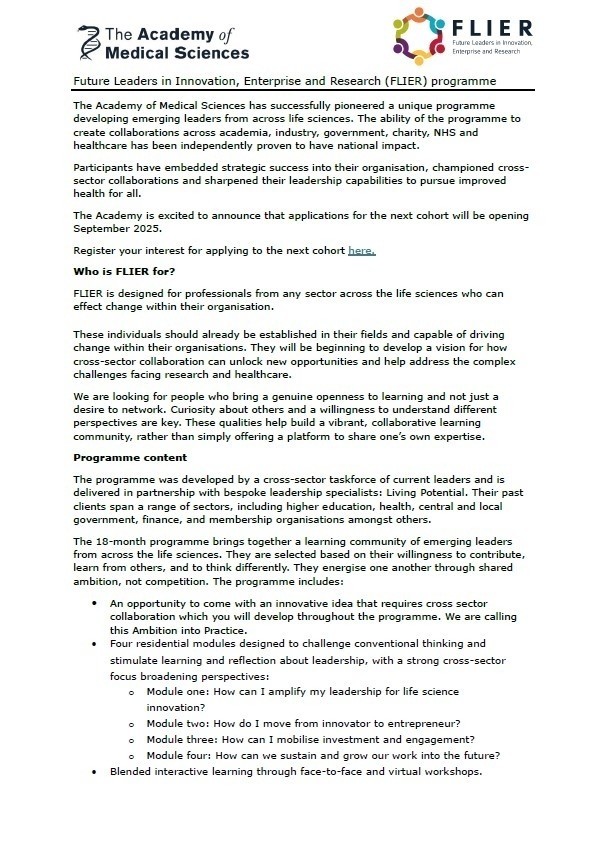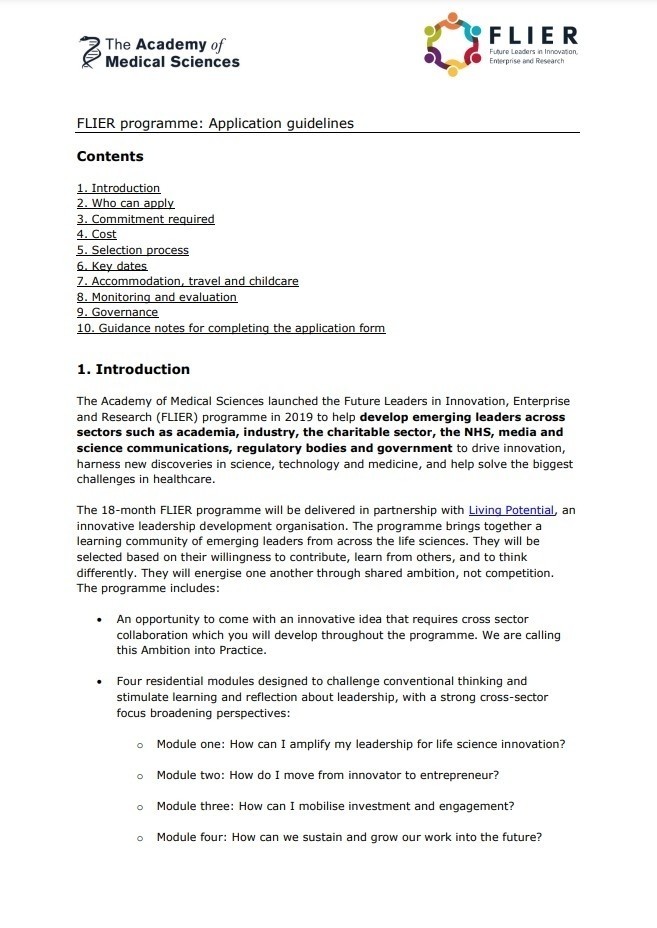The 18-month programme brings together a learning community of emerging leaders from across the life sciences and includes:
- An opportunity to come with an innovative idea that requires cross sector collaboration which you will develop throughout the programme. We are calling this Ambition into Practice.
- Four residential modules designed to challenge conventional thinking and stimulate learning and reflection about leadership, with a strong cross-sector focus broadening perspectives:
- Module one: How can I amplify my leadership for life science innovation?
- Module two: How do I move from innovator to entrepreneur?
- Module three: How can I mobilise investment and engagement?
- Module four: How can we sustain and grow our work into the future?
- Blended interactive learning through face-to-face and virtual workshops.
- Tailored professional coaching to support personal growth and lasting impact.
- Immersion experiences with national organisations across Government, NHS, Academia, Industry, Charity / NGO sector to increase sector awareness and knowledge.
We expect the core elements of the programme to require 20 days time commitment. In addition, there is an expectation that participants will be applying the learning to further the development of their Ambition into Practice throughout the life of the programme and beyond.
Participants benefit from the programme by:
- Increasing their understanding of effective leadership skills, participants will be supported become innovators through a proven combination of practical workshops, coaching, powerful self-reflection and learning.
- Developing a practical, in-depth understanding of the cultures and drivers of other sectors within health and life sciences beyond their own.
- Learn to apply tools, contacts, and collaborations to further the development of their own Ambition into Practice.
- Establishing strong and long-lasting cross-sector networks of peers and senior leaders.
- Practical experience of collaborative working through applied learning opportunities.
______________________________________________________________________
Supporters
The FLIER Programme is generously supported by the Government Department for Science, Innovation and Technology (DSIT).
FLIER is designed for professionals from any sector across the life sciences who can effect change within their organisation.
These individuals should already be established in their fields and capable of driving change within their organisations. They will be beginning to develop a vision for how cross-sector collaboration can unlock new opportunities and help address the complex challenges facing research and healthcare.
We are looking for people who bring a genuine openness to learning and not just a desire to network. Curiosity about others and a willingness to understand different perspectives are key. These qualities help build a vibrant, collaborative learning community, rather than simply offering a platform to share one’s own expertise.

The first three pilot cohorts have finished the programme. The Academy is committed to working towards diversity and equality of opportunity. We also find it important to be transparent with our diversity data.
- In cohort 1, the 17 selected participants are drawn from four sectors – there are 9 representing Academia, 3 representing Government/public and charitable sector, 3 representing Industry, and 2 representing the NHS. 8 of the 17 participants are women.
- In cohort 2, the 18 selected participants are drawn from four sectors – there are 12 representing Academia, 2 representing Government/public and charitable sector, 2 representing Industry, and 2 representing the NHS. 11 of the 18 participants are women.
- In cohort 3, the 19 selected participants are drawn from six sectors – there are 12 representing academia, 2 representing the charitable sector, 2 representing industry, 1 from government/public/policy, 1 representing the NHS and 1 representing media/science communications. 13 of the 19 participants are women.
The programme was developed by a cross-sector Taskforce of current leaders, and is delivered in partnership with bespoke leadership specialist: Living Potential. Their past clients span a range of sectors, including higher education, health, central and local government, finance, and membership organisations amongst others.
Current members of the FLIER Taskforce are:
- Professor David Adams FMedSci (co-chair), Emeritus Professor of Hepatology, University of Birmingham
- Dr Pauline Williams CBE FMedSci (co-chair), Pharmaceutical Medicine Consultant
- Professor Tim Chico, Professor of Cardiovascular Medicine, University of Sheffield
- Dr Luke Devey, Chief Medical Officer, Quell Therapeutics
- Robert Dufton, Chief Executive, Moorfields Eye Charity
- Professor Niina Kolehmainen, Professor of Child Health Research, Newcastle University
- Dr Melanie Lee CBE FMedSci, Life Science Business Consultant, Think10
- Dr Dhruv Parekh, Director, Birmingham NIHR/Wellcome Clinical Research Facility
- Dr Ruth McKernan CBE FMedSci, Venture Partner, SV Health Investors
- Dr Michael Quinn, Consultant Nephrologist, Belfast HSC Trust
- Dr Louise Wood CBE FMedSci, Chair, Association of Medical Research Charities
- Professor Dame Ijeoma Uchegbu FMedSci, Professor of Pharmaceutical Nanoscience, University College London
For further background on why we developed the programme read our former President Professor Sir Robert Lechler FMedSci's blog, 'Why the future needs a new kind of leader'.
In June 2018 we were delighted to announce that the programme would be supported by the UK Government’s Investment in Research Talent - read more on the £11.2 million pounds for innovative schemes the Academy will receive through this 'Talent fund'.
We are also delighted to have received a pledge from the Dennis and Mireille Gillings Foundation in September 2018, which supported our first three cohorts of the programme - read more about their support for leaders in medical science.
The 19 participants of the third round of FLIER (June 2022 – June 2024) are:
- Dr Rubina Ahmed, Director of Research, Policy and Services, Blood Cancer UK
- Professor Alex Casson, Professor of Biomedical Engineering, University of Manchester
- Professor Joan Condell, Professor of Intelligent Technologies, Ulster University
- Professor Bibek Gooptu, Professor of Respiratory Biology, University of Leicester
- Dr Gita Khalili Moghaddam, UKRI Innovation Scholar, University of Cambridge
- Dr Simon Lambden, Head of Medical Science, Inotrem
- Professor Julie-Anne Little, Professor in Optometry & Vision Science, Ulster University
- Ms Emma Lowe, Head of Research Policy: Clinical Research and Growth, Department of Health and Social Care
- Professor Charlotte Manisty, Professor of Cardiology, University College London
- Dr Maeva May, Associate Director of Systems Engagement, Stroke Association
- Dr Jacqueline Maybin, Senior Clinical Research Fellow, MRC Centre for Reproductive Health, University of Edinburgh & Honorary Consultant Gynaecologist, NHS Lothian
- Dr Shivani Misra, Senior Clinical Lecturer in Diabetes & Consultant in Metabolic Medicine, Imperial College London
- Dr Dhruv Parekh, Associate Professor in Critical Care and Respiratory Medicine, University of Birmingham
- Professor Sheena Ramsay, Professor of Public Health & Epidemiology, Newcastle University
- Dr Jenny Rivers, Director of Research & Development, Barts Health NHS Trust
- Dr Sarah Stock, Reader & Honorary Consultant in Maternal and Fetal Medicine, University of Edinburgh
- Dr Helen Surana, Associate Editor, BMJ Innovations
- Professor Mike Trenell, Honorary Professor of Digital Medicine, Newcastle University
- Professor Paul Welsh, Professor of Molecular Epidemiology, University of Glasgow
Contents
FLIER programme
What is the FLIER programme and how was it designed?
The Future Leaders in Innovation, Enterprise and Research was a novel leadership programme commissioned by the Academy of Medical Sciences in 2019. The purpose of the programme was to develop emerging leaders across Life Sciences to work across disciplines and sectors to address the most pressing health concerns of our society. The core principles to cover were initially raised and identified by a Taskforce consisting of sector leaders and Fellows at the Academy. It was initially designed and delivered by Cirrus, later Accenture, until 2024.
How is the programme delivered?
The administration of the programme is handled by the Academy, and the delivery of leadership content through the various workshops and events is handled by our delivery partner, Living Potential. We work with their facilitators to deliver the best experience possible for FLIERs.
What sort of time commitment is needed?
We expect the core elements of the programme to require 20 days time commitment. In addition, there is an expectation that participants will be applying the learning to further the development of their Ambition into Practice throughout the life of the programme and beyond.
Why does my employer need to make a financial contribution?
The cost of delivering the programme encompasses staff overheads, appointment and delivery of the unique leadership training, event space hire, organising networking events and accommodation is substantial. Whilst we are supported by generous funders, we ask for a nominal fee to cover the funding gap and to signal a commitment from employer that they endorse your participation on the programme.
What kind of deliverable is expected during the programme?
We ask FLIERs to look for an opportunity to apply their leadership training throughout the course of the programme. There is no official exam or coursework type element to ‘pass’ the programme, but it will be expected for FLIERs to present/pitch their learnings to a panel of experts from different backgrounds as the end of programme element.
What sort of support is provided?
The Academy covers the cost of food and overnight accommodation where required. We do not pay travel costs to attend the events. If you require alternative methods of accessing the content such as interpreters, subtitles, spaces for prayer or breastfeeding, or childcare, the Academy can support you in the design of our events – please do reach out to discuss.
What have other FLIERs gone on to do after the programme?
The broad picture is that FLIERs have moved from one sector to another (e.g. Academia to industry) or been promoted within their sector. Several have commercialised their research or set up and sold products to Google. Others have set up large scale clinical trials to measure the impact of COVID. See the Case studies document to review examples.
Application
When and where can I apply?
You can apply online via Flexi-grant when applications open 2nd September 2025. Applications will close 15th October 17:00 (BST).
Will there be other applications and can I apply again if I’m unsuccessful?
There will be further cohorts of FLIER planned to take place after the fourth. Unsuccessful applicants to this cohort can reapply to future cohorts. Shortlisted FLIER applicants who are unsuccessful are eligible to receive mentoring from FLIER alumni.
How do I complete my application?
Please view our Application Guidelines.
What are the application components?
Participants will be asked to share/answer:
- Information about their current employment and sector background
- Demonstrate relevant experience
- Support from your employer
How competitive is the process (number of applicants vs selections)?
1 in 3 applicants were successful in applying to the most recent cohort.
Eligibility
Do I need to be in a formal position of ‘senior leadership’ to apply?
We do not require applicants to be in senior leadership. We ask that applicants be in a position of enough influence to be able to effect change in their organisation.
When will I hear back if I’m eligible?
You will receive an update on your application by 17 November 2025. Shortlisted applicants will be invited to interview and will be asked to prepare a mini inquiry.
Shortlisting and selection
Who are the selection panel?
The selection panel will be made up of independent experts and leaders from across life sciences some of whom form our Taskforce. Additional people who may form the panel are those who have had previous involvement with our programme such as immersion hosts.
During selection, what criteria will the panel make decisions on?
For shortlisted applicants, panel members will consider your interactions with other applicants and answers at interview. A final decision will be made after all shortlisted applicants have been interviewed.
Personal concerns
What if my employer can’t afford the contribution?
We understand not all organisations will be able to afford the contribution of £5000.00. The Academy is able to offer discretionary bursaries for selected participants whose employer is unable to provide payment, if a sufficient case is made. There is also the possibility of paying in instalments if the sum is too large to make in one payment.
I’m juggling a lot – how do past participants manage the workload?
We ask employers to confirm that any successful applicants be given protected time to understand this programme. To manage expectations, we publish all our key dates for core activities in advance for successful applicants to plan around.



